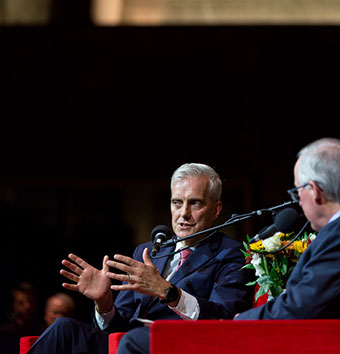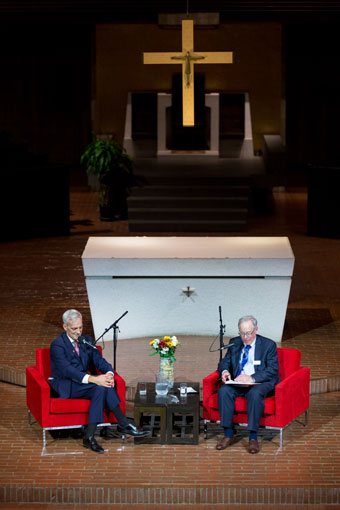McDonough '92 shares perspectives on career during McCarthy Lecture
October 17, 2018
By Dave DeLand

Denis McDonough ’92

Denis McDonough ’92 with Ken Jones, CSB/SJU professor of history
McCarthy Lecture event photos credit: Ali Jungles ’19
History is about stories and perspectives, and Denis McDonough ’92 has played a major role in both – from his undergraduate days at Saint John’s University to the broad spectrum of public service that took him to the pinnacle of the United States government.
“Being able to go into the White House every day was a huge blessing,” said McDonough, who served as President Barack Obama’s White House Chief of Staff from 2013-17. “I refuse to accept that the best days of America are behind us. It’s not consistent with the history that we’ve lived.”
Sharing that history and perspective is part of the process, which brought McDonough to the Saint John’s Abbey and University Church Monday, Oct. 15, as featured speaker for the 12th annual Eugene J. McCarthy Lecture.
“The United States has constantly renewed itself by that regular flow of new blood,” said McDonough, who graduated summa cum laude from SJU with a degree in history and Spanish. “Call that Jeffersonian or call that Benedictine, I like that a lot and I think we should keep doing it.”
McDonough served as Deputy National Security Advisor and National Security Council Chief of Staff before his four years as White House Chief of Staff.
“Just to remind people of the extraordinary nature of Denis’s service, if you look at chief of staff since the position was created after World War II, the average tenure in this position is 18 months,” said interviewer Ken Jones, CSB/SJU professor of history and a McDonough faculty favorite during his undergraduate years. “Denis served four years, so this is an awesome accomplishment.”
“Despite his intense schedules, he regularly met with student groups that I would take out to Washington, D.C., for our summer internship program,” added Matt Lindstrom ’92, CSB/SJU political science professor and director of the McCarthy Center. “He always left each one of us thoroughly impressed and proud.”
Monday’s McDonough/Jones question-and-answer session quickly turned into a litany of stories – about politics, about Saint John’s and about the world in general, mixed with perspectives McDonough gained along the way:
- On the role his liberal arts education at CSB and SJU played in his career trajectory: “The ability to discern, to prioritize and to collate information that you learn as a liberal arts student as we do here at Saint John’s is absolutely pivotal.”
- On his three years as a starting safety for the Saint John’s football team and the late John Gagliardi: “I have a recurring dream every August where I’m actually able to suit back up and run out onto the field – except when I get on the field I don’t have my cleats or can’t find my helmet or some other things that shows you what a weirdo I am.”
- On his candor in the 2017 book The Gatekeepers, which argues that the White House chief of staff is the second-most powerful position in the U.S. government: “A couple months ago, I went upstairs and our youngest son (Teddy) was reading the book. He’s 11, and I got a little nervous. He said, ‘Dad, you swear a lot in this book.’”
- On the demands of the chief of staff position: “The volume and speed is very difficult. Unless you’re very, very good at keeping secrets, you’re at the mercy of the news cycle. News gets made not in the newspapers and not on the nightly news now. It gets made on Twitter.”
- On handling the pressures of his White House job: “It’s the John Gagliardi rule – you get your shot, but there’s 180 guys on the team. You don’t get to screw up twice, because somebody who’s just as good if not better is going to come along. That’s a life lesson – if you get your shot to fix something, don’t fumble it.”
- On the state of American political discourse: “I’m struck that the coarsening of the culture that’s come as the result of the president’s lies and attacks is spilling outside of Washington. The problem is explaining that to your kids and wanting them to have the kind of civil discourse we see here or have throughout the day with the McCarthy Center.”
- On how to fix Washington’s political impasse: “We talked today in class about keeping score. We’re engaged in a scrimmage where the Democrats just talk to themselves and the Republicans just talk to themselves and don’t actually engage each other in a real debate. The things that have made us strong as a democracy over time are the things that we need more of now – transparency, data-based, science-based, experience-based policies and debate. The alternative is not something I want to be part of.”
- On his advice for young citizens: “The first thing you need to do is go and vote. Nineteen percent of 18-to-24-year-olds voted in 2016. None of you are going to leave here tonight and listen to a playlist put together by your grandma. You’re not here in an outfit picked out by your grandma. But right now you have a government that chances are your grandma was more likely to have voted for than you are.”
- On the current state of the country: “Part of what gives me great hope is it’s NOT as bad as 1968. And 1968 wasn’t as bad as 1861. At a moment when the debate is not a debate but a cacophony, the answer is not more yelling and screaming. The answer is more highly reasoned, aggressively proven experiential policies that got us where we are.”
- On moving forward with confidence: “I never wondered if I was in the right place. The wondering wasn’t getting there – the wondering was whether I’d succeed. That’s what John Gagliardi taught me by giving me a shot. When you get your shot, take it. Don’t wait. Don’t second-guess yourself. Just give it a shot. That’s been happening from Saint John’s and Saint Ben’s for decades.
McDonough left the White House in January 2017. He has no interest in public office or a political position, focusing instead on refugee issues.
“I know what I want to do – I want to go help refugees. I’m not waiting around for government service,” McDonough said. “The world’s a broken place, but there’s a role for individuals to help fix it. I think the most broken place right now is people forced from their homes with nowhere to go.”
Doing that entails implementing the Benedictine ideals McDonough learned at Saint John’s and Saint Ben’s.
“I want to find a way to make sure that I’m living out all the ideals that we learned here,” he said. “You can’t play if you’re not in the game. The sky’s the limit for Johnnies and Bennies.”
